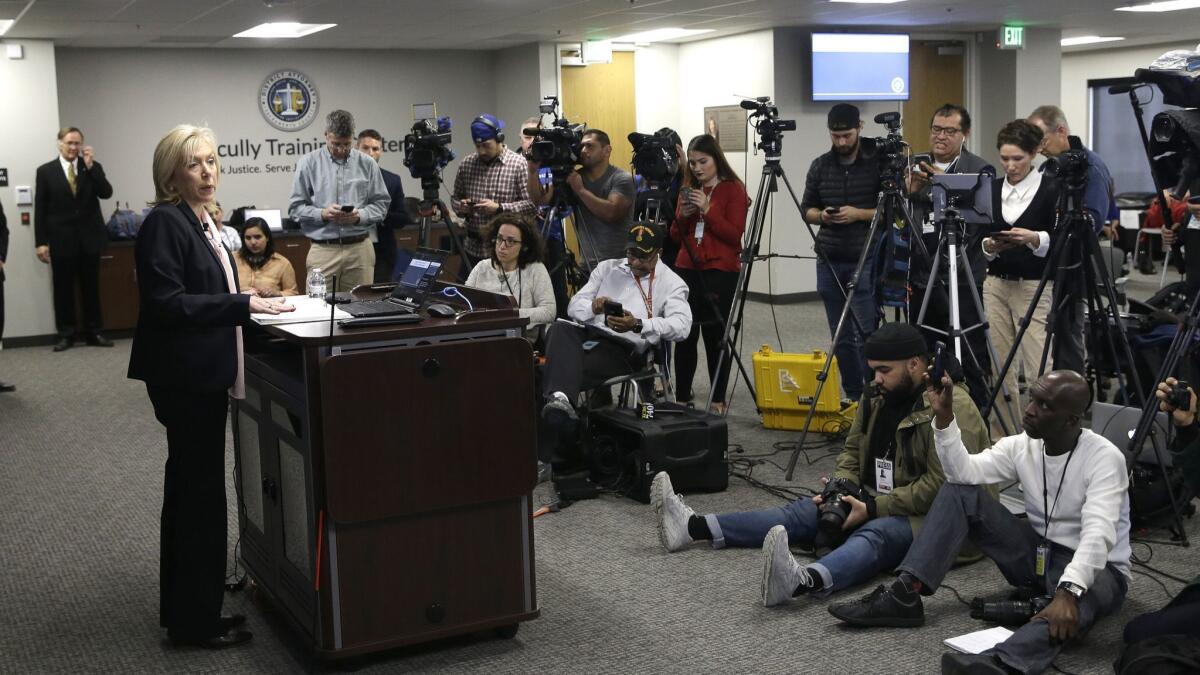Editorial: Stephon Clark’s killing was an injustice, yes, but not a murder

- Share via
Sacramento County Dist. Atty. Anne Marie Schubert’s decision not to file criminal charges against the two officers who shot 22-year-old Stephon Clark to death a year ago did not reflect a determination that the officers acted properly. It was not a clean bill of health for their training, their department or their profession. It was not a statement that all is as it should be in policing and in racial equity. It was merely a conclusion — a proper one — that the officers did not commit crimes.
Murder charges against police officers are too often held up as the gold standard of justice in fatal police shootings of young unarmed African American men like Clark. That simplistic calculus allows us to pretend that racism and injustice are alien forces that police spread through neighborhoods while on patrol, and that ridding ourselves of those evils can be as simple as weeding bad cops out of our law enforcement agencies.
And indeed, there are bad cops. But not every shooting that seems in retrospect to have been avoidable is committed by a bad cop. Clark found himself in harm’s way thanks to a host of circumstances that prey upon many black young men.
Schubert’s recitation at a news conference of Clark’s personal circumstances — including his numerous anguished calls to his girlfriend, his emails and texts, his search records showing he was studying suicide — was gratuitous in that the police knew none of it at the time they encountered him. The details had no bearing on their decision to open fire. But they do help explain his behavior. He was distraught. He needed help of a kind police are ill-equipped to provide.
Not every shooting that seems in retrospect to have been avoidable is committed by a bad cop.
The officers who followed Clark to his grandmother’s backyard were responding to reports of vandalism in the neighborhood. They encountered a man who turned toward them, advanced and, Schubert said the evidence showed, assumed a shooting stance. They shot him, expecting that they would find a firearm in his possession. They found instead a cellphone.
In response to the Clark shooting, California lawmakers last year proposed a bill that would change the standards that determine when police may lawfully resort to deadly force. Under the bill, they would have to first seek reasonable alternatives. They could fire only when the circumstances make it “necessary.” It’s a worthy bill, and although it failed to pass last year, a version has been introduced in the current session and deserves support.
But even many of the experts who promoted the bill as it made its way through the Legislature last year quietly acknowledged that had it been law at the time of the Clark shooting, it would not have changed the analysis. Police cannot be expected not to follow a suspect. And when they do follow and catch up and the suspect turns toward them with what in their experience and training appears to be a shooting stance, with an object in hand, they cannot be expected to know that it is a phone. They cannot be expected to wait for the suspect to fire before determining that it is a gun.
The killing was “justified,” as that term is used in evaluation of police shootings. But is was also an injustice, in the sense that a man having an emotional meltdown ought to have an array of services and options at his disposal to help him cope without harming himself or others. His family — anyone’s family — ought to be able to call someone with the skill and expertise to defuse the situation without resorting to deadly weapons.
Enter the Fray: First takes on the news of the minute »
When armed police do respond, they ought to have the training and experience to de-escalate the situation when they can.
After Schubert announced her decision, Sacramento Mayor Darrell Steinberg correctly distinguished between the question of criminal charges against police and the larger question of whether the interaction between the police and Clark had gone as it should.
“Was the outcome wrong and unacceptable?” he asked. “The answer is yes.”
Of course it is immensely infuriating — and frustrating and tragic — when a person loses his life at the hands of police who misjudged the danger they faced. Changes to the use-of-force standard are appropriate, but more community services and support and police training are paramount to ensure that more people don’t put themselves and others in harm’s way, and more police don’t find themselves without an alternative to pulling the trigger.
Follow the Opinion section on Twitter @latimesopinion and Facebook
More to Read
A cure for the common opinion
Get thought-provoking perspectives with our weekly newsletter.
You may occasionally receive promotional content from the Los Angeles Times.










